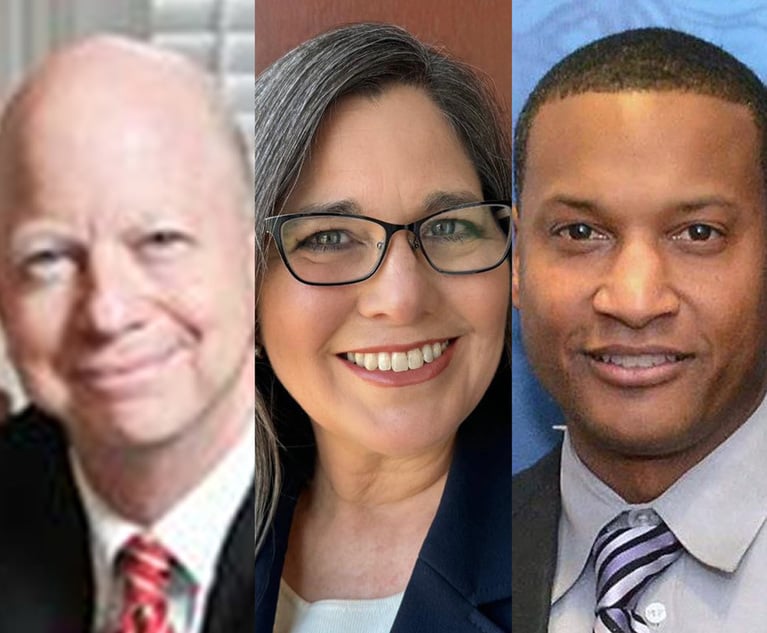 Sam Starks, a senior attorney with The Cochran Firm Atlanta/courtesy photo
Sam Starks, a senior attorney with The Cochran Firm Atlanta/courtesy photoArbery's Death Shows Black Man Can Be Killed on 'Mere Suspicion'
The senseless and brutal killing of Arbery illustrates the ongoing problem and viciousness of racism, specifically racial profiling and stereotyping of black people as criminals who must be captured, punished, and taught a lesson.
June 02, 2020 at 03:14 PM
4 minute read
The killing of Ahmaud Arbery reveals a number of troubling truths about our society, law enforcement and the criminal justice system. If you are black, you can be killed based on mere suspicion that you have committed a crime, denied the benefit of an unbiased and adequate police law enforcement investigation, and be denied equal treatment and protection under the law.
As a trial attorney, I find it hard to conceive of a winning defense strategy in the criminal prosecutions of Gregory and Travis McMichael that does not racialize, criminalize and devalue black lives. While I respect the constitutional right to a fair trial and effective assistance of counsel, even the most creative rationalization of this incident cannot avoid the unescapable truth that Arbery was killed because he is black.
As described by his grieving father, the shooting death of Arbery was a "modern-day lynching." At 25 years old, Arbery was gunned down in the road where he was jogging after being chased and confronted by two armed white men in a pickup truck. While attempting to defend himself, Arbery struggled with one of the men who was carrying a shotgun, while the second man brandished a pistol. Arbery died from shotgun wounds to his chest.
This incident occurred in a predominantly white and middle-class neighborhood in Brunswick, Georgia. Like many southern cities, Brunswick has a significant black population, but a checkered history of race relations, despite once being labeled a "model Southern city" for its peaceful path toward desegregation.
It is no coincidence that for more than two months the circumstances surrounding Arbery's death did not result in an arrest or any meaningful investigation by local police and prosecutors. But for the public release of a video of the incident, and the resulting public outcry, Gregory and Travis McMichael, father and son, would not have been arrested and charged with the murder and aggravated assault of Arbery.
The death of Arbery is reminiscent of the post-Reconstruction era in the South, where white supremacy, white lynch mobs, and vigilante killings of black men was business as usual. The assault and death of Arbery is the fruit of America's history of racism, oppression, dehumanization, and criminalization of black people. With the release of the video, Arbery's death has been widely condemned, but should not be viewed as an isolated incident.
The senseless and brutal killing of Arbery illustrates the ongoing problem and viciousness of racism, specifically racial profiling and stereotyping of black people as criminals who must be captured, punished, and taught a lesson. Even worse, the Arbery case landed on the desk of two prosecutors who recused themselves, before a third prosecutor received the case in mid-April, which led to the arrest and charges against the McMichaels. As if conceding there can be no justice for Arbery in South Georgia, the case is now assigned to a fourth prosecutor in metro Atlanta.
Arbery could have been any black person in America. To his white assailants, it did not matter whether he was a doctor, lawyer, bus driver or student. It did not matter if he was a father, husband, son, or brother. Even if his assailants truly believed he committed a crime justifying a citizen's arrest, it did not matter to them whether Arbery was guilty or innocent. The McMichaels were motivated to pursue and confront Arbery because of their ignorance, revulsion and suspicion of black men.
As a nation, we should take a hard look at laws that may facilitate or justify racial bias, such as Georgia's "citizen's arrest" and "stand your ground" laws. As citizens, we must continue to confront, protest, and fight against racial bias and stereotyping of black people as criminals who must be detained, arrested, prosecuted and incarcerated at any cost.
Sam Starks is a former public defender and criminal defense attorney who is now a senior attorney with The Cochran Firm Atlanta.
This content has been archived. It is available through our partners, LexisNexis® and Bloomberg Law.
To view this content, please continue to their sites.
Not a Lexis Subscriber?
Subscribe Now
Not a Bloomberg Law Subscriber?
Subscribe Now
NOT FOR REPRINT
© 2024 ALM Global, LLC, All Rights Reserved. Request academic re-use from www.copyright.com. All other uses, submit a request to [email protected]. For more information visit Asset & Logo Licensing.
You Might Like
View All

Who Got the Work: 16 Lawyers Appointed to BioLab Class Action Litigation
4 minute read

'Possible Harm'?: Winston & Strawn Will Appeal Unfavorable Ruling in NASCAR Antitrust Lawsuit
3 minute readLaw Firms Mentioned
Trending Stories
- 1Gibson Dunn Sued By Crypto Client After Lateral Hire Causes Conflict of Interest
- 2Trump's Solicitor General Expected to 'Flip' Prelogar's Positions at Supreme Court
- 3Pharmacy Lawyers See Promise in NY Regulator's Curbs on PBM Industry
- 4Outgoing USPTO Director Kathi Vidal: ‘We All Want the Country to Be in a Better Place’
- 5Supreme Court Will Review Constitutionality Of FCC's Universal Service Fund
Who Got The Work
Michael G. Bongiorno, Andrew Scott Dulberg and Elizabeth E. Driscoll from Wilmer Cutler Pickering Hale and Dorr have stepped in to represent Symbotic Inc., an A.I.-enabled technology platform that focuses on increasing supply chain efficiency, and other defendants in a pending shareholder derivative lawsuit. The case, filed Oct. 2 in Massachusetts District Court by the Brown Law Firm on behalf of Stephen Austen, accuses certain officers and directors of misleading investors in regard to Symbotic's potential for margin growth by failing to disclose that the company was not equipped to timely deploy its systems or manage expenses through project delays. The case, assigned to U.S. District Judge Nathaniel M. Gorton, is 1:24-cv-12522, Austen v. Cohen et al.
Who Got The Work
Edmund Polubinski and Marie Killmond of Davis Polk & Wardwell have entered appearances for data platform software development company MongoDB and other defendants in a pending shareholder derivative lawsuit. The action, filed Oct. 7 in New York Southern District Court by the Brown Law Firm, accuses the company's directors and/or officers of falsely expressing confidence in the company’s restructuring of its sales incentive plan and downplaying the severity of decreases in its upfront commitments. The case is 1:24-cv-07594, Roy v. Ittycheria et al.
Who Got The Work
Amy O. Bruchs and Kurt F. Ellison of Michael Best & Friedrich have entered appearances for Epic Systems Corp. in a pending employment discrimination lawsuit. The suit was filed Sept. 7 in Wisconsin Western District Court by Levine Eisberner LLC and Siri & Glimstad on behalf of a project manager who claims that he was wrongfully terminated after applying for a religious exemption to the defendant's COVID-19 vaccine mandate. The case, assigned to U.S. Magistrate Judge Anita Marie Boor, is 3:24-cv-00630, Secker, Nathan v. Epic Systems Corporation.
Who Got The Work
David X. Sullivan, Thomas J. Finn and Gregory A. Hall from McCarter & English have entered appearances for Sunrun Installation Services in a pending civil rights lawsuit. The complaint was filed Sept. 4 in Connecticut District Court by attorney Robert M. Berke on behalf of former employee George Edward Steins, who was arrested and charged with employing an unregistered home improvement salesperson. The complaint alleges that had Sunrun informed the Connecticut Department of Consumer Protection that the plaintiff's employment had ended in 2017 and that he no longer held Sunrun's home improvement contractor license, he would not have been hit with charges, which were dismissed in May 2024. The case, assigned to U.S. District Judge Jeffrey A. Meyer, is 3:24-cv-01423, Steins v. Sunrun, Inc. et al.
Who Got The Work
Greenberg Traurig shareholder Joshua L. Raskin has entered an appearance for boohoo.com UK Ltd. in a pending patent infringement lawsuit. The suit, filed Sept. 3 in Texas Eastern District Court by Rozier Hardt McDonough on behalf of Alto Dynamics, asserts five patents related to an online shopping platform. The case, assigned to U.S. District Judge Rodney Gilstrap, is 2:24-cv-00719, Alto Dynamics, LLC v. boohoo.com UK Limited.
Featured Firms
Law Offices of Gary Martin Hays & Associates, P.C.
(470) 294-1674
Law Offices of Mark E. Salomone
(857) 444-6468
Smith & Hassler
(713) 739-1250






